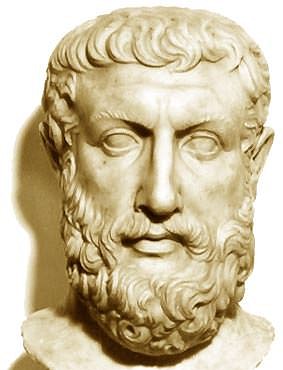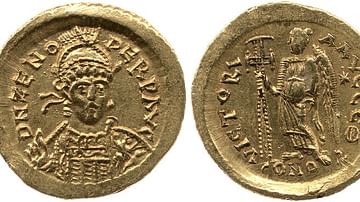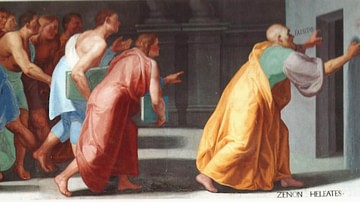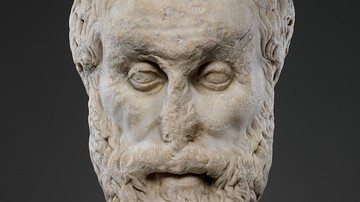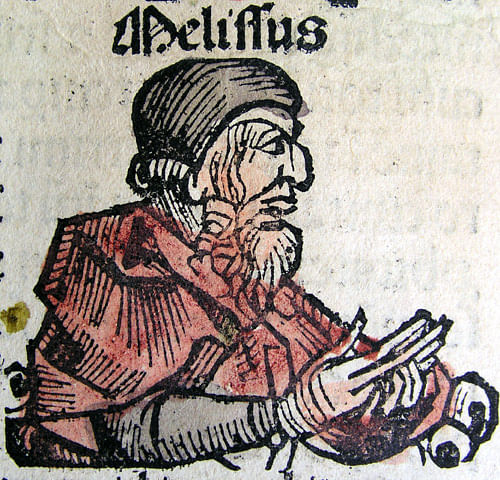
Melissus of Samos (l. c. 5th century BCE) was a Greek philosopher of the Eleatic School, considered the third great proponent of that philosophy's claim that reality is One, after Parmenides (l. c. 485 BCE) and Zeno of Elea (l. c. 465 BCE). Melissus primarily restated Parmenides' vision but expanded it in claiming reality is limitless.
Almost nothing is known of his life outside of a brief mention that he was a military commander. His works have all been lost, and his thought is only preserved by mentions in those of later writers such as Aristotle (l. 384-322 BCE) and Simplicius of Cilicia (l. c. 490 to c. 560 CE). His military career is addressed by the historian Plutarch (l. c. 45/50 to c. 120/125 CE) in his Life of Pericles. Melissus was most likely a student of Parmenides, though this is unclear, and is thought to have been the teacher of Leucippus the Atomist (l. c. 5th century BCE), who influenced Democritus (l. c. 460 to c. 370 BCE) and his theory of an atomic universe.
Melissus is frequently cited as the last great Eleatic philosopher but, just as often, is omitted from discussions on Parmenides and Zeno of Elea, as some scholars, following Aristotle's criticism, claim he is only restating Parmenides' philosophy and any differences are superficial. Melissus' thought actually departs from Parmenides, however, in claiming that What-Is is unlimited, non-corporeal, and eternal, whereas Parmenides placed limits on existence, arguing for the present moment as encapsulating reality.
Melissus' most important contribution, though, was his clarification of Eleatic thought. Parmenides presented his ideas through dense poetry and Zeno through logical paradoxes. Melissus, in contrast, wrote in clear prose, explaining the Eleatic vision of reality as a whole, undifferentiated One of which all human experience was a part. Each individual, then, was of the same substance as the whole, neither coming into being nor passing away, and the human insistence on the 'facts' of birth, change, and death was a misinterpretation of the true nature of life, which caused one to suffer by believing in multiplicity and change when there was only unity. This line of thought would influence later philosophers besides Leucippus and Democritus, including Plato (l. 428/427 to 348/347 BCE) and Aristotle.
Reputation as Philosopher & General
Melissus was a native of the island of Samos and seems to have already been known as a philosopher by 441/440 BCE when he commanded the Samian navy against the aggression of the Athenian statesman Pericles (l. 495-429 BCE). Plutarch, working from an older source, cites Melissus as a "philosopher who was then acting as general," and this is understood to mean Melissus was already well educated and had established a reputation, but it does not support the claim that he had already written his most important work, On Nature (or On the Nature of Things), by this time. Plutarch characterizes Melissus as an effective commander:
Close on the heels of [Pericles'] victorious pursuit, came his seizure of the harbor and then he laid formal siege to the Samians who, somehow or other, still had the daring to sally forth and fight with him before their walls. But soon a second and a larger armament came from Athens and the Samians were completely beleaguered and shut in. Then Pericles took sixty triremes and sailed out into the main sea, as most authorities say, because he wished to meet a fleet of Phoenician ships which was coming to the aid of the Samians, and fight it at as great a distance from Samos as possible; but according to Stesimbrotus, because he had designs on Cyprus, which seems incredible. But, in any case, whichever design he cherished, he seems to have made a mistake. For no sooner had he sailed off than Melissus, the son of Ithagenes, a philosopher who was then acting as general at Samos, despising either the small number of ships that were left, or the inexperience of the generals in charge of them, persuaded his fellow-citizens to make an attack upon the Athenians. In the battle that ensued, the Samians were victorious, taking many of their enemy captive, and destroying many of their ships, so that they commanded the sea and laid in large store of such necessities for the war as they did not have before. And Aristotle says that Pericles was himself also defeated by Melissus in the sea-fight which preceded this. (Life of Pericles, 26:1-3)
Whether Melissus was associated with the Eleatic School at this time is unknown. Plutarch's description of his victory over the Athenians is the only biographical passage of any length to have survived. All that is known of Melissus otherwise are the claims that he was Parmenides' student and Leucippus' teacher. It seems likely both claims are true, but they do not have to be; Melissus could have simply responded to the works of Parmenides and Zeno without needing to have studied under or with either of them, and Leucippus, likewise, may have simply responded to Melissus' work without any formal instruction.
The Eleatic School
However he came to his conclusions, though, they were a direct response to Parmenides and the monist vision of the Eleatic School that reality is of a single substance, uncreated, and indestructible. According to the less-than-reliable historian Diogenes Laertius (l. c. 180-240 CE), Parmenides was a student of Xenophanes of Colophon (l. c. 570 to c. 478 BCE) who rejected the polytheistic view of his time and claimed there was only one God, vastly different from human beings in every way. This monotheistic vision, according to Laertius, informed Parmenides' claims of the unity of the sensible world as Xenophanes also taught that, just as the truth of divinity differed from opinions about it so did the observable world.
It is certainly possible, even probable, that Xenophanes was Parmenides' teacher, but as with claims regarding Melissus and other Pre-Socratic Philosophers (thinkers who lived and wrote before Socrates), it is far from certain. Parmenides may have been influenced by Xenophanes' works without ever even meeting him or arrived at similar conclusions regarding the gods and reality independently. Parmenides, not Xenophanes, is usually cited as the founder of the Eleatic School, and his fundamental teaching was that there was a way of truth and a way of opinion; the way of truth recognized the unity of all existence, while the way of opinion was clouded by trusting one's senses and believing in the illusion of plurality – that one was separate from others and from one's world – and change.
Parmenides claimed that one's senses are unreliable, and one must rely on rational thought to apprehend reality clearly. One might claim that plurality and change are constants of life, based on what one perceives – such as aging or death – but these aspects of life relate only to one's outward appearance, not one's essence. That-which-is can never have not-been nor can it have come into existence from nothing because nothing can come from nothing (existence cannot be generated by non-existence) and, also, what-is can never pass away into nothing because nothing – that which does not exist – cannot receive what does exist any more than a cup without a bottom can hold water.
Melissus’ Arguments
Melissus agreed with Parmenides on these points but rejected his claim that reality had boundaries, that what-is is held in place by a balance (a concept usually translated as "justice") that keeps it uniformly in space and time. Parmenides writes:
It is necessary that being either is absolutely or is not. Nor will the force of the argument permit that anything spring from being except being itself. Therefore, justice does not slacken her fetters to permit generation or destruction, but holds being firm. (Fairbanks, 93)
Reality, to Parmenides, exists in time and space, bound by the force of balance to remain constant and unchanging. Melissus challenged this claim, arguing that what-is is eternal, beyond space and time, and limitless. Melissus writes:
Since, therefore, it did not come into being, it is and always was and always will be, and has no beginning or end, but is infinite. For if it had come into being, it would have a beginning (for it would have begun to come into being at some time) and an end (for it would have ceased to come into being at some time). But since it neither began nor ceased, it is and was and always will be and has neither beginning nor end. For it is impossible for anything to be forever, unless it exists entire. (Robinson, 141-142)
Melissus begins with the assertion that reality is of one, single, unified substance and proceeds from that point with the argument that what-is cannot have emerged from nothing – and so always existed – and that which has always existed is impervious to change because, if it were subject to change, it would no longer be itself and so could not be claimed to have 'always existed'; therefore unchanging reality is of one substance and is eternal. Melissus also notes that reality, and the sentient beings who participate in it, cannot rationally suffer pain and loss because these both involve some sort of change, and in Melissus' universe, there is no such thing. There is only the semblance of change, not change itself, as he explains:
Neither does it [reality] suffer pain. For if it suffered pain, it would not be completely; for a thing that suffered would not be able to exist forever. Nor would it have equal power with what is healthy. Nor would it be the same, if it were to suffer pain; for it would suffer pain through the addition or subtraction of something and would no longer be the same. Nor would what is healthy be able to suffer pain; for in that case what was healthy and in being would pass away, and what was not would come into being. And the same reasoning applies to sorrow as to pain. (Robinson, 147)
If one is experiencing sorrow or pain, one is recognizing some sort of loss – of health, of a loved one, of a certain pleasurable set of circumstances – but, if reality is of one substance and eternal, there can be no loss, only the semblance of loss produced by one's belief in the reliability of one's senses. The senses establish that one is born, lives, experiences loss, and dies, but if the individual is of the same substance as reality – as one must be since, in Melissus' view, all of what-is is constituted of the same matter – pain, sorrow, and loss cannot be experienced as they seem to be, and if one believes one is experiencing them, one is simply misinterpreting the true nature of existence.
Differences with Parmenides
In this, he was in agreement with Parmenides, but the latter claimed pain and sorrow were simply illusions and also differed from Melissus in claiming that the One was both temporal and spatial. To Parmenides, only the present moment exists, and this is the true nature of reality. The past exists only in one's memory, not objective reality, and the future only consists of one's hopes or fears. To Melissus, this reality-as-moment claim was only acceptable if one understood that moment as eternal, not grounded in time or space.
In this same way, Melissus says, motion is impossible for what-is. If what-is is complete, infinite, and eternal, there is no void, no space into which what-is can move, so the concept of motion must be a misapprehension. Parmenides and Zeno claimed that motion was an illusion, and had to be, because of the unity of what-is. Melissus disagreed with the definition of motion as illusion arguing that it is not so much illusion but simply inconsequential to the nature of reality. One can sail from Samos to Athens and will then be in a different location, but this does not change the nature of oneself or one's relationship to what-is.
Melissus argues that the One – all being – is completely full admitting of no loss, and so cannot move, "For, if what-is is divided, it moves; but if it moved, it would not be" (Robinson, 145). Motion suggests open space since there must be somewhere for that-which-moves to occupy after leaving its present spot but, since the One is limitless, there is no such space, so motion is impossible. Individual humans, however, can move within this reality because it is neither spatial nor temporal, nor corporeal, and so, within this, a person can move from place to place without affecting the nature of reality in any way. In this view, the effect of a human sailing from Samos to Athens would affect reality as much as an ant crossing one's front porch would the structure of one's home.
Parmenides, however, claimed that all motion had to be an illusion because every person participated in the same substance of reality. If reality is understood as unchanging, individual people are also unchanging in essence, no matter what one's senses might suggest. To Parmenides, supported by Zeno, one cannot sail from Samos to Athens – one can only appear to do so – since Samos and Athens are, essentially, the same place, manifestations of the same substance of the One as every other place.
Conclusion
Melissus' explanation of the Eleatic vision seems to have had significant influence on later writers, not so much because of his arguments and differences with Parmenides but owing to the clarity of his prose. Parmenides presented his beliefs through poetry, and Zeno of Elea supported his teachers' claims through logical paradoxes. Melissus, however, wrote in clear and precise prose, according to Simplicius, and so the concepts concerning the One were much easier to understand.
The Eleatic vision of a single, unchanging, reality influenced Plato's development of his Theory of Forms – the claim that there exists a higher, eternal, realm of which the sensible world is only a reflection – and Aristotle's suggestion of a Prime Mover, itself unmoving, which set all else in motion. Aristotle, however, credits Parmenides with fully developing the Eleatic view and Zeno with defending it, rejecting Melissus' views as nonsense:
The reasoning of Melissus is crude and presents no difficulty; accept one absurdity and the rest follow – there is nothing difficult in this. (Physics, I.2.185a; Robinson, 149)
Aristotle's rejection of Melissus seems to have had to do with his logic. Melissus' claim that the One is eternal because it has no beginning and no end is an assumption in that one cannot know whether existence had a beginning or whether it will end. Melissus, like Parmenides, simply asks an audience to accept his premise as true and then builds his argument on his assumption. If one rejects the claim that existence has no beginning, Melissus' other arguments fall apart. His argument against motion, for example, only holds true if one accepts an unchanging, completely full Oneness as constituting reality, but there were many other philosophers who rejected this vision, such as Heraclitus of Ephesus (l. c. 500 BCE) who claimed that existence was in a constant state of change.
Even so, Melissus' version of the Eleatic vision seems to have exerted considerable influence in helping to establish the understanding of a changeless aspect to the apparently ever-changing world. This argument would influence Leucippus – whether he was Melissus' student or not – in his exploration of the basic stuff that made up the observable world. Leucippus' work influenced his student Democritus, who developed the theory of the atomic universe, arguing that all things are made of tiny 'uncuttables' known as atomos – atoms – that form now one thing and now another but cannot be destroyed. This theory, of course, is recognized as true by various disciplines in the present day and is understood as having been inspired by the Eleatic School's monism and the clarity of the works of Melissus of Samos.
